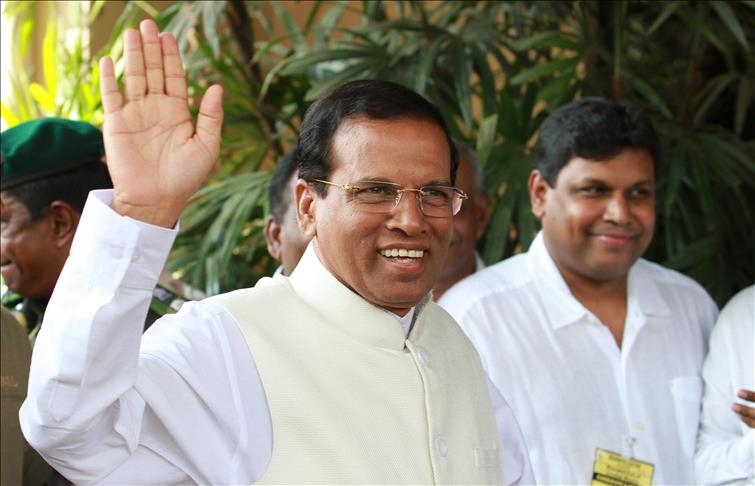Maithripala Sirisena: Sri Lanka's surprise president
Sri Lanka's new president-elect will take office after gaining support from government defectors and disaffected minorities

COLOMBO, Sri Lanka
It was only in November that Maithripala Sirisena broke away from the now outgoing Sri Lankan government to announce his bid for presidency, but Friday's election results have proved his shock move successful.
Sirisena, a former health minister in the cabinet and general-secretary of Sri Lanka Freedom Party, was a close ally of outgoing President Mahinda Rajapaksa until his defection, which prompted other political figures to also leave the ruling coalition.
Rajapaksa won the last election in 2010 on the back of a government and army victory that ended 27 years of civil war in 2009.
Many in Sri Lanka's civil society and among its minorities, however, have since accused Rajapaksa's government of being nepotistic, undemocratic and suppressing the identities of minorities such as Tamils and Muslims. These were the issues Sirisena campaigned around.
"This country has so many unaddressed issues, many of them linked to governance and economic mismanagement. We are committed to addressing those issues," Sirisena had said during the campaign. "This is why there are defections from the government to our side. People are crying for justice and good governance."
Initial election results appear to show that minorities voted overwhelmingly in favor of Sirisena, with him winning up to 80 percent of the votes in some northern and eastern areas, where there are high Tamil and Muslim populations.
Rajapaksa marginally won in constituencies in the south, which are predominantly Sinhalese Buddhists and were supportive of him after the end of civil war. The outgoing president won all southern constituencies but not by the large margins that Sirisena got in Tami and Muslim areas.
Sirisena's support consisted of an unusual coalition of parties dissatisfied with Rajapaksa's rule, including Marxists, Buddhists nationalists and Muslim and Tamil parties.
Only weeks prior to Thursday's election, former justice minister Rauf Hakeem, head of the country's largest Muslim party, resigned from the cabinet to support Sirisena, saying Rajapaksa's government had not provided justice to Muslims who have been targeted by violence linked to Sinhalese-majority Buddhist nationalists.
"We have been completely disrespected and our religious-cultural identities suppressed," said M.T. Hasen Ali, general-secretary of Hakeem's Sri Lanka Muslim Congress.
"The Mahinda Rajapaksa administration is linked to too many hawkish elements that actively suppress minority rights. There had never been a time like this, when a government has consistently allowed attacks on religious and ethnic identities," Ali said, explaining the party's decision to join Sirisena's government.
Many of Sirisena's political supporters appeared to switch sides mostly out of frustration with Rajapaksa's government, which has been accused of human rights’ abuses and militarizing the country in the post-war period. Many among the Tamil population, who were heavily affected by the war between the government and separatist Tamil rebels, have been calling for greater steps towards national reconciliation.
"Above all, there should be facilitation for a process of healing. The next government must make it a political priority," said Selvam Adaikalanathan, a Tamil parliamentarian from Vanni in the island’s north.
Who is Sri Lanka's new president?
Sirisena was part of the government that was determined to end Sri Lanka's decades-long civil war. He also survived a suicide attack by the Liberation Tigers of Tamil Eelam, when his convoy was attacked in Colombo in October 2008 that killed one person and wounded seven others.
Sirisena, the son of Albert Sirisena, is a Second World War veteran from Polonnaruwa in the island’s North Central Province. He became a member of the Sri Lanka Freedom Party since he turned 17.
Jailed during a Marxist insurrection in 1971, Sirisena studied agriculture for three years at the Sri Lanka School of Agriculture in Kundasale, in central Sri Lanka, before obtaining a diploma in political science from the Maxim Gorky Literature Institute in Russia.
He entered the Sri Lankan parliament for the first time in 1989 and held several cabinet portfolios since 1994. Former president Chandrika Kumaratunga appointed him as the Leader of the House in 2004, but he resigned in August 2005, ahead of the election that saw Rajapaksa first become president.
Anadolu Agency website contains only a portion of the news stories offered to subscribers in the AA News Broadcasting System (HAS), and in summarized form. Please contact us for subscription options.

